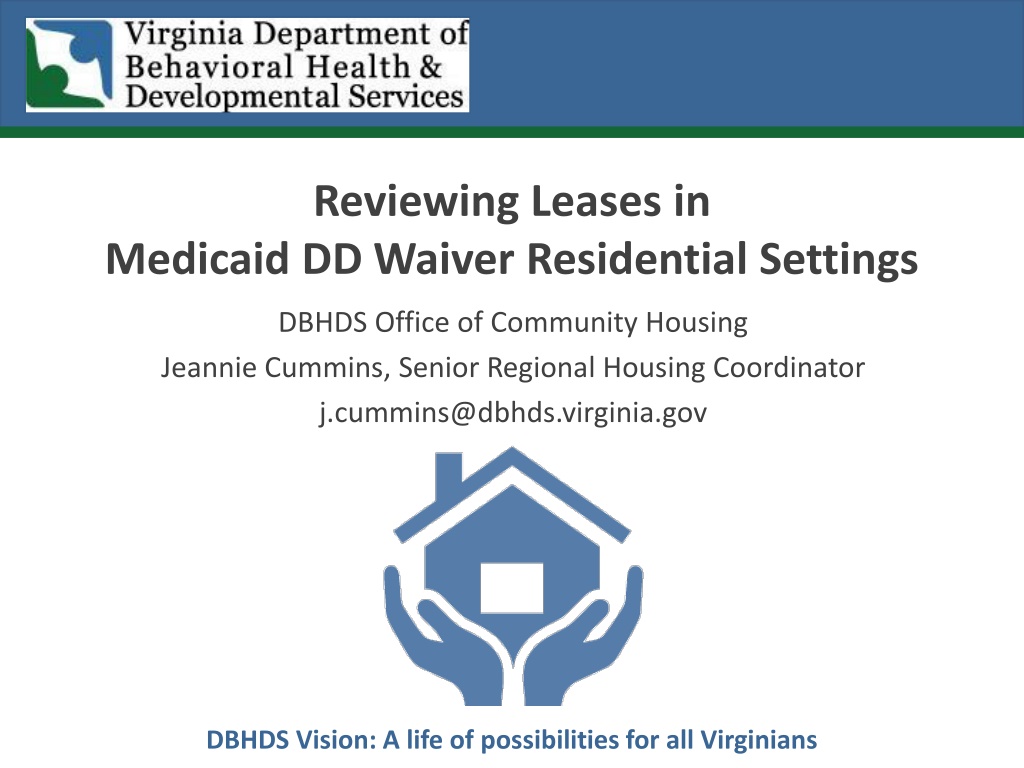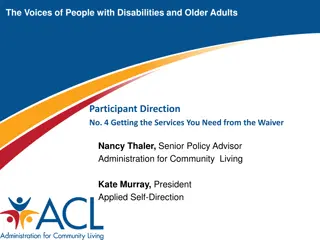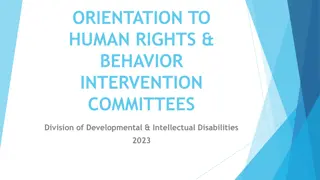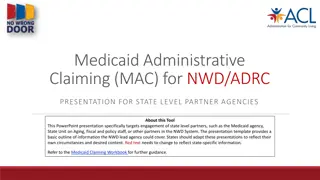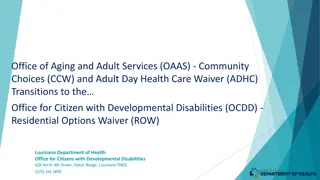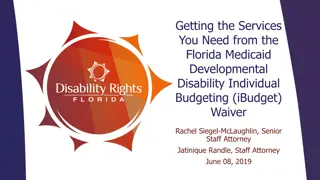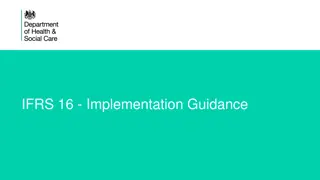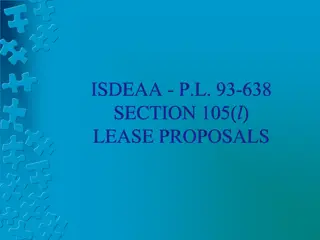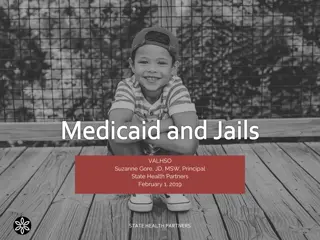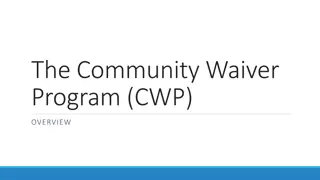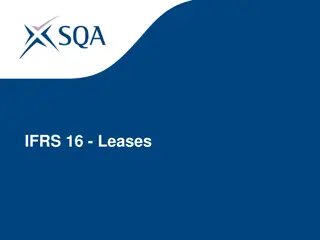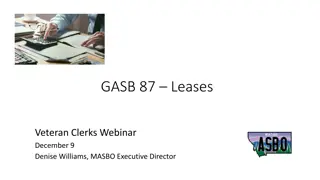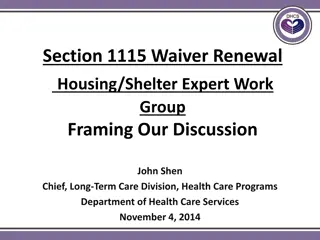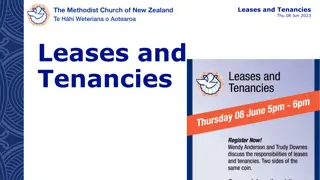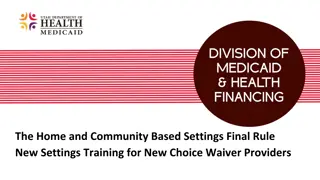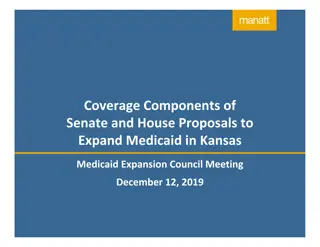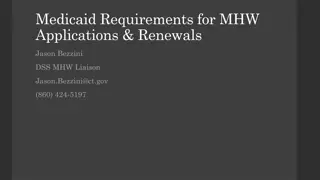Understanding Leases in Medicaid DD Waiver Residential Settings
Exploring the importance of leases in residential settings covered by the HCBS Settings Rule for Medicaid DD Waiver programs. The presentation highlights key terms, provisions, and protections for individuals with developmental disabilities living in provider-owned or controlled residential settings. It emphasizes the need for legally enforceable agreements to ensure quality living standards and tenant rights under landlord/tenant law.
Download Presentation

Please find below an Image/Link to download the presentation.
The content on the website is provided AS IS for your information and personal use only. It may not be sold, licensed, or shared on other websites without obtaining consent from the author. Download presentation by click this link. If you encounter any issues during the download, it is possible that the publisher has removed the file from their server.
E N D
Presentation Transcript
Reviewing Leases in Medicaid DD Waiver Residential Settings DBHDS Office of Community Housing Jeannie Cummins, Senior Regional Housing Coordinator j.cummins@dbhds.virginia.gov DBHDS Vision: A life of possibilities for all Virginians
Agenda Why are leases required in residential settings? Covered settings Key terms and provisions a lease should contain Terms and provisions a lease should NOT contain Problematic lease provisions Other key VRLTA protections for tenants and landlords What to do if a lease has problematic terms & provisions Questions and Answers Slide 2
Why Are Leases Required in Residential Settings? Centers for Medicare & Medicaid Services (CMS) Home and Community Based Services (HCBS) Settings Rule (CMS 2249-F/2296-F) Applies to Medicaid programs that fund HCBS, including Virginia s Medicaid Waiver program for people with developmental disabilities Establishes requirements for the quality of settings eligible for Medicaid HCBS reimbursement Slide 3
Why Are Leases Required in Residential Settings? HCBS Settings Rule Provider-owned or controlled HCBS residential settings have additional requirements Setting must be physically accessible Individuals must: have privacy in their unit control their own schedule be able to have visitors at any time have a lease or other legally enforceable agreement with similar protections Slide 4
Why Are Leases Required in Residential Settings? HCBS Settings Rule In provider-owned or controlled residential settings: the unit or dwelling is a specific physical place that can be owned, rented, or occupied under a legally enforceable agreement the individual has the same responsibilities and protections from eviction that tenants have under landlord/tenant law Slide 5
Covered Residential Settings Medicaid DD Waiver- funded residential settings covered by the HCBS Settings Rule in Virginia: Group home Residential Sponsored Residential Supported Living Slide 6
Lease Terms & Provisions The following slides about what leases should and should not contain are for informational purposes only. All parties should consult legal counsel prior to executing any legally binding agreement. Slide 7
Terms & Provisions Leases SHOULD Contain A statement that the lease is enforceable under the Virginia Residential Landlord Tenant Act (VRLTA) A description of the property address, setting type and characteristics Areas of the property to which the tenant has sole access communal access restricted or prohibited access Slide 8
Terms & Provisions Leases SHOULD Contain Length of lease agreement (e.g., month to month, 1 year) Terms for renewing or terminating the lease (e.g., X days prior written notice) Rent terms: date rent is due each month and the date by which it is considered late monthly rent amount any pro-ration for a partial month fees for late rent, bounced checks Any required fees in addition to the rent amount Slide 9
Terms & Provisions Leases SHOULD Contain Description of who provides and pays for each utility (landlord or tenant) House rules and tenant responsibilities regarding: Pets Visitors Noise Decorating Housekeeping Smoking How tenant/landlord damages will be handled Conditions under which the landlord can access the tenant s space, e.g.: 24 or 48 hour written notice for non-emergencies no notice for emergencies Slide 10
Terms & Provisions Leases SHOULD Contain Explanation of: what constitutes remediable and non- remediable breaches of the agreement by the landlord/tenant remedies available to the landlord or the tenant if either breaches the agreement the process for resolving disputes related to the agreement Slide 11
Terms & Provisions Leases SHOULD NOT Contain Provisions that require the tenant to: agree to waive or forgo rights or remedies under the Virginia Residential Landlord Tenant Act (VRLTA) authorize any person to confess judgement on a claim arising out of the rental agreement agree to pay the landlord s attorney fees (except as permitted by VRLTA) Slide 12
Terms & Provisions Leases SHOULD NOT Contain Provisions that require the tenant to: agree to exculpate or limit landlord liability to the tenant arising under law or indemnify the landlord for that liability or any associated costs pay for a security deposit AND purchase a bond or commercial insurance policy to secure the performance of the terms and conditions of a rental agreement, if the total of the security deposit and bond or insurance coverage exceeds two months rent Slide 13
Terms & Provisions Leases SHOULD NOT Contain Provisions that: allow the landlord to charge excessive fees for late rent require the tenant to pay more than 2 month s rent in a security deposit and/or damage insurance 2.1: If rent is not paid by the fifth of the month, it is considered overdue. The penalty for overdue rent is $500 per month. Slide 14
Problematic Lease Terms & Provisions Problematic provisions are not illegal, but may cause the tenant substantial hardship Examples: requiring the tenant to pay a security deposit AND first and last month s rent prohibiting multiple sources of rent payment creating onerous notice requirements for the tenant (e.g., more than 60 day written notice to non-renew the lease) charging the tenant the remaining value of the lease contract if the tenant fails to provide proper notice to vacate or to non-renew the lease requiring tenants pay for the landlord s cost to repaint, re-carpet, or replace furniture upon move out Slide 15
What to Do If a Lease Has Problematic Terms & Provisions Point out the prohibited lease terms to the landlord/provider and provide references from the Landlord Tenant Handbook. Negotiate with the landlord/provider: explain how the lease requirement interferes with the person s ability to access HCBS ask what the business necessity is for this requirement Notify the individual s support coordinator about lease concerns Submit a complaint about a HCBS Settings Rule violation to: DBHDS Office of Licensing: http://www.dbhds.virginia.gov/assets/doc/QMD/OL/ol-complaint- form_nov_18_19_distributed.pdf Virginia Department of Medical Assistance Services: https://www.dmas.virginia.gov/contactforms/#/home Slide 16
Other Important VRLTA Protections for Tenants Landlords must provide contact information for legal assistance if they send a tenant who receives rent assistance a notice to terminate tenancy Tenants can designate a third party to receive duplicate copies of: written notices from the landlord relating to the tenancy a summons for unlawful detainer issued pursuant to 8.01-126 Slide 17
Other Important VRLTA Protections for Landlords Landlords have rights during a tenant s extended absence. They can: enter the dwelling unit when reasonably necessary to protect the landlord s possessions and property terminate the rental agreement as of the date of abandonment by the tenant recover damages actual damages from the tenant, including a claim for rent that would have accrued until the rental agreement expires or until a new rental agreement commences, whichever occurs first landlord is obligated to mitigate actual damages for a breach of rental agreement landlord cannot seek a post-possession judgement for accelerated rent through the end of the term of the tenancy Slide 18
Resources Virginia Statement of Tenant s Rights and Responsibilities: https://www.dhcd.virginia.gov/sites/default/files/Docx/l andlord-tenant/statement-of-tenant-rights-and- responsibilities-english.pdf Virginia Residential Landlord Tenant Handbook: https://www.dhcd.virginia.gov/landlord-tenant- resources Virginia Poverty Law Center: www.vplc.org Virginia Legal Aid: https://www.valegalaid.org/issues/housing/landlord- and-tenant-issues Slide 19
